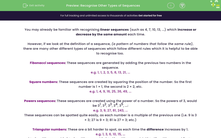You may already be familiar with recognising linear sequences (such as 4, 7, 10, 13, ...) which increase or decrease by the same amount each time.
However, if we look at the definition of a sequence, (a pattern of numbers that follow the same rule), there are many other different types of sequences which follow different rules which it is helpful to be able to recognise too.
Fibonacci sequences: These sequences are generated by adding the previous two numbers in the sequence.
e.g. 1, 1, 2, 3, 5, 8, 13, 21, ...
Square numbers: These sequences are created by squaring the position of the number. So the first number is 1 × 1, the second is 2 × 2, etc.
e.g. 1, 4, 9, 16, 25, 36, 49, ...
Powers sequences: These sequences are created using the power of a number. So the powers of 3, would be 31, 32, 33, 34, 35, ...:
e.g. 3, 9, 27, 81, 243, ...
These sequences can be spotted quite easily, as each number is a multiple of the previous one (i.e. 9 is 3 × 3; 27 is 9 × 3; 81 is 27 × 3; etc.)
Triangular numbers: These are a bit harder to spot, as each time the difference increases by 1.
e.g. 1, 3, 6, 10, 15, ...
1 to 3 = difference of 2; 3 to 6 = difference of 3; 6 to 10 = difference of 4; 10 to 15 = difference of 5, etc.
In this activity, we will recognise and define the types of sequences shown, as well as finding unknown terms by continuing sequences in the same pattern.








